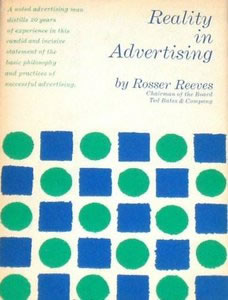
First published in 1960, Rosser Reeves answers to the question “What makes an advertising campaign succeed?” are still relevant – and frequently still ignored.
He defines advertising simply: “Advertising is the art of getting a unique selling proposition into the heads of the most people at the lowest possible cost.”
He contends that you must first establish a baseline measurement of penetration (the number of people who do and don’t remember your advertising). With this knowledge, you can measure the effectiveness (over time) of your advertising (called usage pull).
The author states that if 50% of your audience knows your message, you shouldn’t assume that it’s the same 50% over time. Therefore, by changing your advertising/marketing message to keep it “fresh” is likely to backfire – you’re losing the memory of your message (which is hard fought and easily lost). Be very careful if your marketing team (or consultant) encourages you to enliven your message – you may cause your previous message to be forgotten.
As in most marketing messages (including talks), your message needs to revolve around a single concept. Easily remembered. Easily recalled. Easily reinforced. While it’s okay to change the “color” of your advertisement, don’t change the single concept.
Your unique selling proposition (USP) must include these three elements (and few campaigns do!):
- Your marketing must make a specific claim (“Buy this product, and you will get this specific benefit.”)
- Your claim must be unique (either something that is intrinsically unique or a something no one else is saying)
- Your claim must sell (pull new customers for your product).
From your USP, you build your brand image by sharing an underlying feeling that reinforces your message. But if your feeling overwhelms your marketing, then it produces a “vampire” effect – people remember the feeling but not the message. As an example, how many people remember what product is being pitched on well-discussed Superbowl commercials?
The bottom line: If you don’t ground your advertising in well-tested principles, do so at your own risk.
EXCELLENT reminder, Jay. Thanks for sharing!
All the best,
Susan